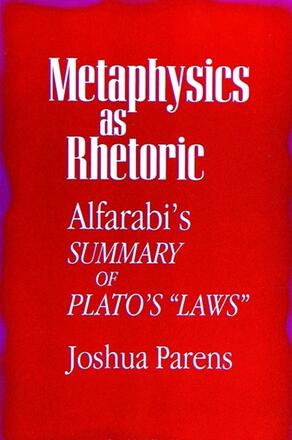
Metaphysics as Rhetoric
Alfarabi's Summary of Plato's "Laws"
Alternative formats available from:
Parens argues that Alfarabi, the tenth-century Muslim philosopher, demonstrated that Plato is not the originator of Western metaphysics, and that what appears to be Plato's metaphysics was intended as a rhetorical defense of his politics.
Description
The most widely accepted view in the West today, particularly among postmodernists, is that Plato attempted to ground politics on a rational metaphysics and initiated the tradition of foundationalism that has given rise to systems of oppression ranging from racism, sexism, and ethnocentrism to the technological mastery of the earth. Metaphysics as Rhetoric controverts this view, arguing that Plato was not the originator of this metaphysical tradition. Using as a basis the tenth-century Muslim philosopher Alfarabi's interpretation of Plato, especially his Summary of Plato's "Laws", Parens shows that what appears to be Plato's metaphysics was intended as a rhetorical defense of his politics. Parens demonstrates that rather than seek to establish politics on the definitive metaphysical ground, Alfarabi's Plato analyzes politics on its own terms, phenomenologically.
Joshua Parens is Bradley Fellow and Adjunct Assistant Professor in the Government Department at Georgetown University.
Reviews
"Parens's scholarship is sound, persuasive, utterly interesting, and compelling. In many ways, this book may even be described as pathbreaking. The breadth of the author's reading in the history of philosophy, coupled with his deep understanding of the issues that have been raised over time, is extremely impressive. I also find his ability to integrate the secondary literature into his general exposition very helpful and masterful. Parens has a unique ability to formulate his concerns in terms of debates that have bothered scholars—and philosophers—through the ages and to contribute intelligently to the ongoing debate. Even those who find their theories skewed in this work cannot help but learn from what Parens has to say." — Charles E. Butterworth, University of Maryland, College Park
"The topic of this book is not only significant to the history of medieval Islamic philosophy but to modern students of political philosophy, law, religion, and classics."—Terence Kleven, Queen's College